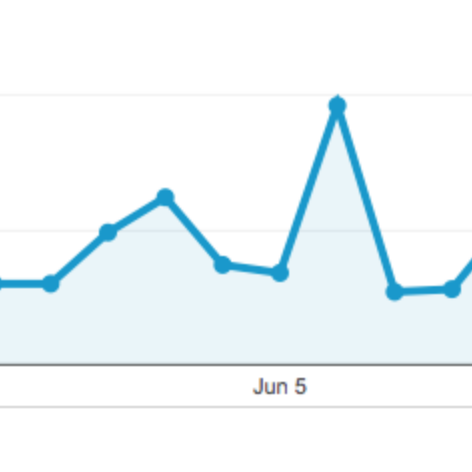👋 I'm curently looking for a new role. Hire me!
When I started Josh Can Help, I billed myself as a “technology tamer,” boldly fighting over-complication, annoyance, disconnection, and frustration across the battlefields of the small business landscape. I wanted to fix computers, build websites, design documents, teach people mobile technology, and construct networks. I would do it all!

While I gained more experience over the last year, I realized my passion really centered around the web but it was more than just laying out sites and coding them. I was enthralled by how people could connect to one another, use simple tools to solve their problems, and create a name for themselves or their business in a way that was never possible before. What motivated me was how anyone could leverage fairly simple technology to reach their goals. I realized that my energy was amplified when I was talking about WEB STRATEGY.
What is Web Strategy?
For all I know, I could be stealing a term from someone else so I apologize if this has been coined in some way before. It’s important to me to know what everyone else thinks about this term as well so your comments are appreciated (but, you know, read this post first).
In one sentence, web strategy is creating a track-able, improvable, and repeatable plan to achieve a specific goal on the internet. If I could add another sentence I’d also say that this strategic plan would always seek to provide a clear return on investment and would be simple and (relatively) inexpensive to execute.
That sums the term up nicely but there are very important components to creating a plan that works for your specific situation. I’m going to give you my take on the subject and I invite you to help me come up with more components.
Web strategy … is scientific

At my core, I am a scientist. This would explain my chemistry degree but it goes beyond that. Scientists use the scientific method which is a rigid, iterative, step-by-step process:
- Come up with a theory (hypothesis) based on existing research to explain a particular phenomenon.
- Design an experiment to test that hypothesis (the important word here is test… not prove); a critical part of this design is data collection
- Organize, combine, and report this data as completely as possible
- Parse and deconstruct this data objectively and completely as it relates to you hypothesis
- Rinse, repeat
In a perfect world (or lab), this method is driven by the desire to DISPROVE your hypothesis. Experiments are designed to find where the hypothesis fails, where the logic is flawed, and where more research needs to be conducted. If, during the course of this process, the evidence supports the hypothesis then you have a solid foundation to move your research forward.
Hopefully you’re seeing how this relates to the web but, if not, let me show you how the scientific method can be used in web strategy.
Building an effective (read: successful) website starts with a goal. Let’s start with a popular goal for people on the web – increase sales leads/inquiries. This goal can be achieved a number of different ways so let’s say we’ve decided one of the ways to increase leads is to create an easy to use contact form. So, we have our hypothesis:
Creating a simple and easy-to use form will increase sales leads.
I think you see where this is going. The experiment, in this case, is to design a simple form using suggestions from people who have done the same. You could try a few different forms and switch them out occasionally, collecting data from each one. The data is the number and quality of sales leads generated from the form and the analysis will speak to whether the form increased the number of inquires, increased the quality of inquiries, or did nothing.
Designing your plan like a scientist keeps you focused on the goal, objective about the results, and ready and willing to start over and try something new.
Web strategy … is focused on returns

I consider my aesthetic sense very pragmatic. I like looking my best as much as possible but you’ll never see me in a pair of shoes that hurt me throughout the day. I’m also a big car nut but I just wouldn’t enjoy driving a car that isn’t comfortable or one that I was filling up twice a week.
Relating this to what I do professionally, I’m always seeking to place function in front of form in all of things I produce – documents, websites, logos, etc. I start my designs in a text file mapping out the information structure and the content organization before I ever open Photoshop. An idea of how I want the site to look appears in my head very early but I don’t make that design come to life until I know what the underlying structure will be.
This all relates back to RETURNS. Spending money on any kind of web technology before you’re clear on how that technology can help you achieve your goals is wasteful and definitely not strategic.
Seeing the returns on your web investment can be difficult or easy, depending on what you’re trying to achieve. If you set out to receive more sales leads and, after a complete redesign, you are getting more leads, that’s great. If you set out to increase brand awareness, it’s a bit more difficult (but not impossible).
But it’s more than just “yay, I did it!” You need to ask yourself a few questions (using the sales lead example from before):
- Did I increase the number of leads AND the quality or just one component?
- Do the website leads become sales or are they just vague inquiries?
- Am I properly set up to react to these leads or am I dropping the ball?
Spending money on a website or spending time marketing your business online is not just due diligence. Have a outcome in mind and be sure that what you’re doing online helps you reach that outcome (unless you’re just screwing around on Twitter because that’s fun sometimes).
Web strategy… makes things better, not worse.
Chores: I hate them. Washing the car, taking out the garbage, cleaning the bathroom… I just feel like I have better things to do with my time. The have-tos in life are a drag, that’s for sure. Why create more of them?
Being truly strategic on the web means that you’re not creating two hours of extra work each day. Being strategic means finding ways to automate repetitive processes and outsourcing (however that’s defined) boring or unappealing tasks. It’s also about finding time in your day by using great, online tools that make your life easier.
But I’m going to take it one step further. Web strategy is about doing new, fun things. It’s about connecting with people in and out of your industry. It’s about expressing yourself in a new way and putting yourself and your ideas out there. It’s about learning new things, sharing your domain knowledge, and getting to know your customers and clients.
The online world is a vibrant, amazing, supportive, strange, and fantastic community. Building your web presence and connecting to that world should be fun and eye-opening. If it isn’t, you’re probably doing something wrong.
Web strategy… is what I do

When I wrote this, I was on a flight back to San Diego from a visit to friends and family in Seattle. I find my trips home very restorative because of the quality time I spend with the people that are so important to me.
This trip back found me in a conversation about the web with almost everyone I saw. People wanted to know why I was on Twitter, how the web could help them promote their business, what that interesting link was that I posted on Facebook, and how my own web strategy was going.
Everyone I talked to was really energized by what I told them about what this limitless online world. One friend made me iterate through each site that I use and why I used it. My dad wanted to understand blogs, LinkedIn, and Twitter better. My mom wanted to know how we could use the web to promote this great idea she had. Another close friend was all ears as I told her about how we could increase the amount of money coming into her non-profit. No one was bored, everyone wanted to know more.
The web is one hell of a place right now and it’s poised to improve without bounds. Sure there are thieves, viruses, hackers, assholes, and problems on the web but what you can achieve and learn there is worth the effort.
< Take Action >
Comment via:
Subscribe via:
< Read More >
Tags
Newer

Jun 24, 2009
Website performance and health reports
Without close monitoring and regular reporting, websites run the risk of losing traffic, accumulating errors, and becoming difficult to search.
Older

Jun 12, 2009
How I explained WTF Twitter is to my Dad
My dad and I have been working on a plan for a website to promote his business valuation report for a few months now. The site that inevitably came up that was Twitter.